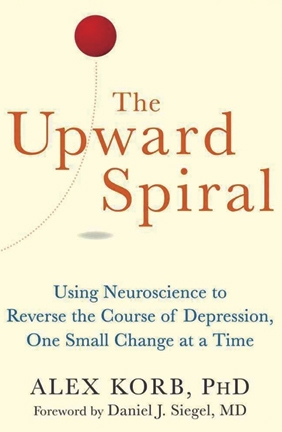The Upward Spiral: Using Neuroscience to Reverse the Course of Depression, One Small Change at a Time by Alex Korb ‘02 (New Harbinger).

Sleep. Exercise. Human connections. Goal-setting. Gratitude. As solutions to the vexing and deep-rooted problem of depression, they seem too simple, somehow. Yet in his new self-help book, The Upward Spiral, neuroscientist Alex Korb ’02 walks readers through the complex chemical and neurobiological reasons why, in his view, they work. Getting on a treadmill won’t cure anyone’s depression by itself, he says, but exercise helps create what he calls an “upward spiral” in which every small change facilitates another small change, each building on the last.
“In complex systems like the brain,” Korb writes, “even a little shift can change the resonance of the whole system. Everything is interconnected. Gratitude improves sleep. Sleep reduces pain. Reduced pain improves your mood. Improved mood reduces anxiety, which improves focus and planning.” And so on.
The book takes a pop-science approach, giving readers the lite version of the neuroscience behind depression and its antidotes. We learn the basics about the various regions of the brain and the role they play in our moods and habits. We learn about the interconnected neural circuits that can cause us to get stuck in a rut and sap our motivation to climb out. We learn about studies that provide stunning insights about the brain, from the power of human contact (it can actually lessen the physical pain of an injury) to the neural benefits of decisiveness: “You may not make all the right decisions, but they will be your decisions. And the mammalian brain works much better when it has some control over the world than when it doesn’t.”
Korb, a postdoctoral scholar at UCLA, coached its women’s ultimate Frisbee team for almost a decade and writes a Psychology Today blog called PreFrontal Nudity (this refers to the prefrontal cortex, the region of the brain that controls planning and discipline). Like the blog, the book is bright and breezy, full of metaphors, anecdotes, and cheerleading. (“Your depressed brain might be telling you to give up. It might be telling you that everything hurts too much to exercise. Thank it for its opinion, and go for a walk.”)
The Upward Spiral insightfully describes the self-defeating loop of depression, a loop so dark that it’s hard to imagine someone stuck in it sitting still for long enough to read this book from start to finish. But each section offers quickly digestible and accessible information that a reader could pull from the shelf as needed. One of Korb’s most compelling insights is that “in depression, there’s nothing fundamentally wrong with the brain.” For people feeling bad about themselves, and then feeling bad about themselves for feeling bad about themselves, The Upward Spiral offers explanations for the hole they’re in, and a map guiding them to first steps on the hard climb out.





